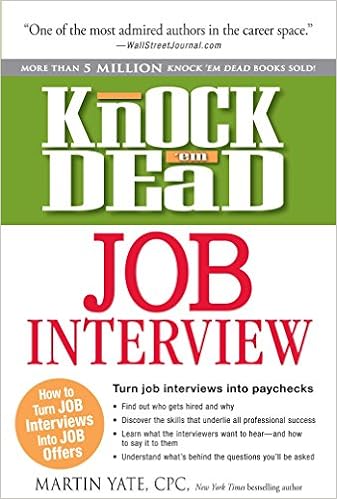- Key Takeaways
- Check Your Connection
- Be Prepared to Interview
- Cut Out the Distractions
- Speak Clearly
- Don’t Eat While on the Call
- Be Professional
- Be Prepared to Ask Questions
- Mastering Your Opening Greeting
- Utilizing a Cheat Sheet Effectively
- Managing Unexpected Interruptions
- Enhancing Vocal Delivery
- Following Up Post-Interview
- Next Steps
- Final Words
We may earn a commission if you click on a product link and make a purchase at no additional cost to you. For more information, please see our disclosure policy.
Last Updated on May 13, 2025
Key Takeaways
- Prepare Your Environment: Before the interview begins, ensure a quiet, distraction-free space with reliable phone reception or landline access.
- Use a Phone Interview Cheat Sheet: Keep a tailored reference with your resume, company facts, and job-specific notes to guide your responses.
- Enhance Verbal Communication: Focus on pacing, clarity, and tone to compensate for the lack of visual cues and create a confident impression.
- Ask Thoughtful Questions: Show initiative by asking about
team structure, performance metrics, and company culture—avoidsalary talk unless invited. - Follow Up Professionally: Send a personalized thank-you email within 24 hours, and follow up politely if no response comes in the stated timeframe.
Phone interviews have become a common first step in the
Check Your Connection
With so many applicants in the queue, technical issues can be why you don’t make it to the next round. Test your phone setup in advance to avoid poor reception or dropped calls. Use a landline if possible—it offers more reliability than a cell phone. If you must use a mobile phone, do a trial call from the exact location where you’ll take the interview. This small step helps ensure that signal strength and clarity won’t undermine your performance.
Be Prepared to Interview
Approach a phone interview with the same level of preparation as an in-person meeting. The primary benefit of a phone format is that you can keep functional materials at your fingertips without the interviewer seeing them. Use this to your advantage to stay sharp and focused throughout the conversation.
- Print out your resume and the job description for reference.
- Keep notes on the company’s background and recent news.
- Have a pen and paper ready to jot down follow-up items.
- Highlight sections of
your resume that align with the job’s needs.
Learn Exactly How To Correctly Prepare For An Interview & Give Yourself The Best Possible Chance Of Getting Hired In The Modern Job Market
Cut Out the Distractions
Preparing your interview space ahead of time can minimize background noise. Distractions can make you seem unprofessional or unfocused at home or elsewhere. A trial run in your chosen location can help you spot any potential problems before the actual call. Communicate with housemates, silence devices, and remove pets from the room. If taking the call outside the home, choose a quiet, private place to speak freely without being overheard or interrupted.
Speak Clearly
Without visual cues like eye contact or body language, how you speak becomes even more critical. Be sure to articulate your thoughts clearly and at a steady pace. This helps the interviewer understand you and demonstrates your confidence. It’s also wise to check audio clarity early by asking, “Can you hear me?” This simple question can prevent awkward communication breakdowns that waste time or make you seem unprepared.
Job Interview Preparation: The Ultimate Resource to Get the Job You Want (Job Hunting, Job Interviewing)
Don’t Eat While on the Call
This might seem common sense, but it’s worth repeating: do not eat during your interview. Chewing sounds and distracted speech can quickly derail your chances. Think of your phone interview the same way you’d think of an in-person meeting—you wouldn’t bring food to that, either. Eat beforehand if necessary, and ensure you’ve used the restroom so you’re fully present and prepared to focus. Being courteous and distraction-free speaks volumes about your professionalism.
Be Professional
Keep the conversation positive, even if you’re unhappy in your current role. Avoid criticizing former employers, managers, or colleagues. Instead, express interest in the opportunity and focus on what excites you about the role. A professional tone helps build credibility and demonstrates maturity, qualities every employer seeks in their next hire.
No matter how good you look, how much research you've done, or how perfectly your qualifications match the job description, if you're not prepared with great answers to the toughest interview questions, you won't get the job.
Be Prepared to Ask Questions
Your interviewer isn’t the only one asking questions and having a few thoughtful inquiries prepared shows you’re engaged, curious, and serious about the position. While some topics—like compensation—are best saved for later rounds, this is your chance to learn more about the company and
- What does a typical day in this role look like?
- How is success measured in this position?
- What is the
team dynamic or company culture like? - What growth opportunities are available within the organization?
The most important thing to remember about phone interviews is that they are real. Treat them with the same respect and professionalism you would bring to an in-person meeting. By preparing properly and staying focused, you can make a lasting impression and increase your chances of moving forward in the
How to Prepare, Perform and Follow Up (Obvious Candidate Job Search Acceleration Series Book 3)
Mastering Your Opening Greeting
First impressions in a phone interview begin the moment you answer the call. A confident and professional greeting sets the tone for the conversation. Instead of a casual “Hello,” consider stating your full name to establish clarity and professionalism immediately. This approach helps the interviewer confirm they’re speaking with the right person and demonstrates your preparedness. Remember, your voice is your primary tool in a phone interview, so ensure your tone conveys enthusiasm and attentiveness from the outset.
Utilizing a Cheat Sheet Effectively
One advantage of phone interviews is the ability to reference notes discreetly. Creating a well-organized cheat sheet can help you stay focused and articulate. This tool should be concise and tailored to the specific role you’re applying for. Here’s how to structure your cheat sheet for maximum effectiveness:
- Key Qualifications: Highlight your top
skills and experiences relevant to the job. - Company Insights: Note essential facts about the company to demonstrate your research.
- Questions to Ask: Prepare thoughtful questions that show your interest in the role.
- STAR Examples: Outline brief Situation, Task, Action, Result stories to illustrate your accomplishments.
Learn how to make a lasting first impression by understanding how others see you and mastering the seven fundamentals that shape every new encounter.
Managing Unexpected Interruptions
Despite thorough preparation, unforeseen interruptions can occur during a phone interview. Handling these situations with composure is crucial. If an unexpected noise or distraction arises, apologize briefly and address the issue promptly. For instance, if background noise becomes disruptive, consider muting your line momentarily or relocating to a quieter area. Demonstrating your ability to manage unexpected challenges calmly can leave a positive impression on the interviewer.
Enhancing Vocal Delivery
Without visual cues, your voice carries the full weight of your communication. It’s essential to convey confidence and clarity through your speech. To enhance your vocal delivery, focus on the following aspects:
- Articulation: Speak clearly and pronounce words accurately to ensure understanding.
- Pacing: Maintain a moderate speaking pace to allow the interviewer to absorb information.
- Intonation: Use varied pitch and tone to express enthusiasm and avoid monotony.
- Pausing: Incorporate strategic pauses to emphasize points and allow for interviewer interjections.
If you don’t get invited to interview, you got screened out of the job. This book will keep you from getting screened out and consistently put you on the short list of candidates who get to interview in person.
Following Up Post-Interview
After the phone interview concludes, it’s essential to follow up appropriately. A thank-you
Next Steps
- Set Up a Dedicated Interview Space: Choose a quiet, well-lit area and test your phone connection in advance to eliminate potential disruptions.
- Create a Personalized Cheat Sheet: Compile key company facts,
your resume highlights, and job-specific notes to keep within reach during the interview. - Practice Your Verbal Delivery: Record yourself answering sample questions to refine clarity, pacing, and tone before the real conversation.
- Prepare Follow-Up Templates: Draft a thank-you
email now so you can personalize and send it quickly after your interview ends.
The game isn't over when you leave the interview. You're still in a conversation about this job, and you can win it or lose it with what you do after the interview. In this report, I show you the very best follow-up strategies that go way beyond a generic thank you note.
Final Words
Preparing for a phone interview means more than just answering questions—it’s about making a confident, memorable impression with nothing but your voice. With the right tools, environment, and mindset, you can build strong rapport, convey your value clearly, and stay ahead of other applicants. Treat each step with purpose, from testing your connection to sending your follow-up, and you’ll set yourself apart in a crowded field of candidates aiming for the same role.
Using his twenty-five years of experience, New York Times bestselling author Martin Yate has established a set of rules for job interviews that is sure to get you noticed.
Related posts:
Mark Fiebert is a former finance executive who hired and managed dozens of professionals during his 30-plus-year career. He now shares expert job search, resume, and career advice on CareerAlley.com.















